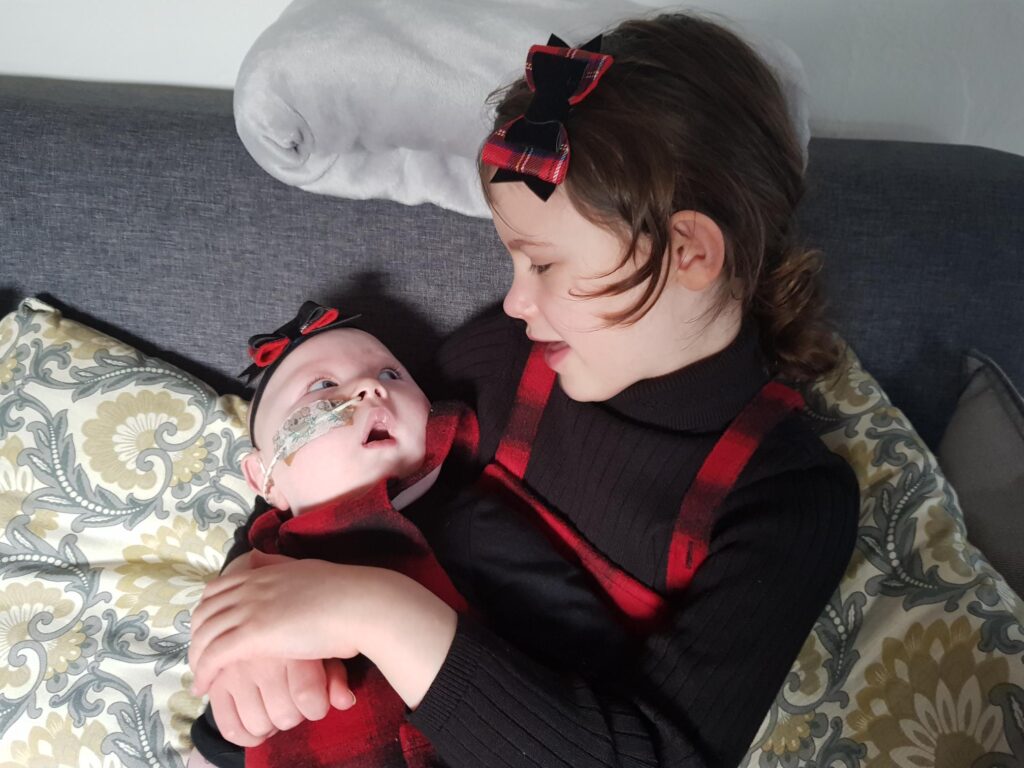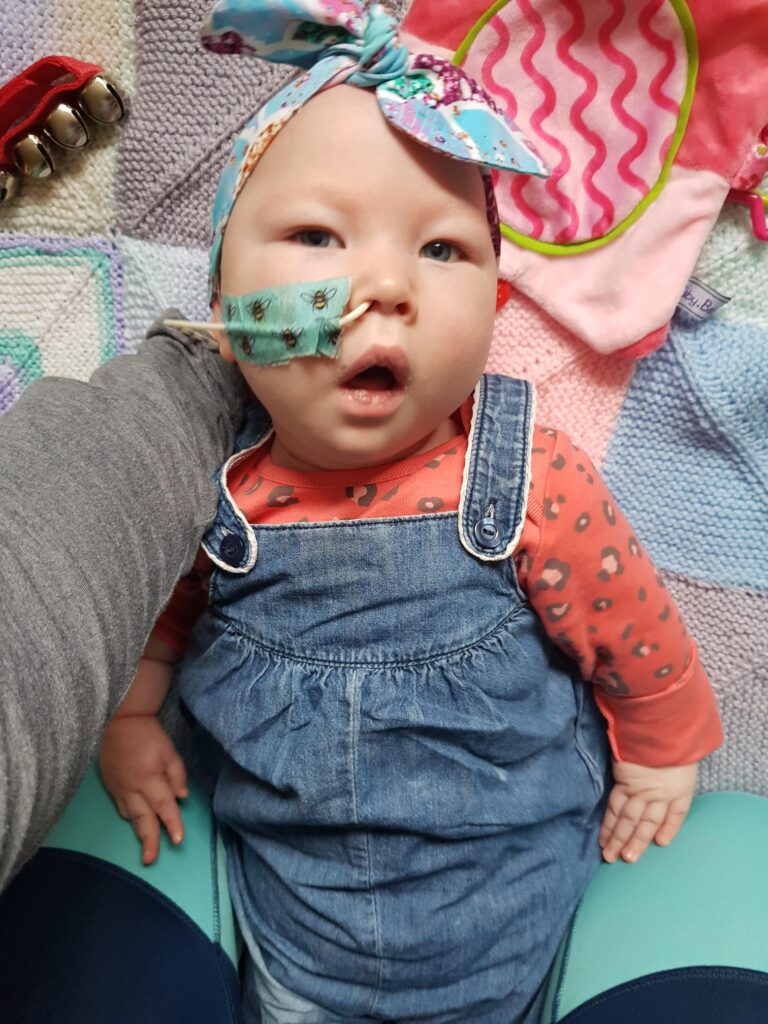
Name: Jennifer Dicks
Location: Armagh, Northern Ireland
Child’s Birth Year: 2019
Keywords: Navigating Sibling Relationships, Cerebral Palsy, Prematurity
Jennifer had come to love the life she had built—she was doing research in chemical engineering, a field she was deeply passionate about, studying to land her dream job of becoming a lecturer, and finally en route to giving her daughter Izzy a sibling. But, in November 2019, with the birth of Charlotte, Jennifer’s life as she knew it changed dramatically.
When Jennifer was twenty-nine weeks into her pregnancy, she began to feel severe pain in her belly. Jennifer thought it was way too early for her to be going into real labor, so she thought she was experiencing Braxton-Hicks contractions (false labor pains). But that evening, while she was walking to the maternity ward in the hospital, Jennifer had a placental abruption and started bleeding profusely. Immediately, she was rushed into an operating room and put under general anesthesia for an emergency C-section. Upon waking up after the surgery, Jennifer was told that Charlotte hadn’t been breathing at birth, required thirty minutes of resuscitation, and was now in the NICU in critical condition.
As doctors told Jennifer to enjoy as much time as she could with Charlotte before she passed away, Jennifer was in a state of shock. How could this be real life? Did she actually wake up after the surgery, or was this a nightmare she was trapped in?
When Jennifer saw Charlotte on a ventilator, Jennifer remembers how unbelievably tiny and fragile she looked. Because Charlotte was so premature, she wasn’t eligible for cooling treatment. During the first few days of her life, Charlotte had multiple seizures, so she was put on phenobarbital. Jennifer assumed that all of these health complications were related to prematurity, since no one mentioned HIE during the entire ten-week stay in the NICU. Not having those answers for such a long period of time only added to the trauma of the experience.
Because MRIs are so difficult to interpret in premature babies, Charlotte had to wait until she was seven weeks old to receive an MRI. At the meeting discussing the results, the pediatrician told Jennifer and Jack, her husband, that Charlotte had extensive damage to her basal ganglia, but that the rest of her brain was relatively okay. She reiterated that Charlotte’s presentation was very severe, and, even if she didn’t die, she would be disabled and dependent for the rest of her life. Before all of this, the worst-case scenario in Jennifer’s mind had been Charlotte not being able to walk. But now, if the only thing Charlotte couldn’t do was walk, that would be the absolute best-case scenario.
It seemed like, every day, Jennifer was being overwhelmed with more bad news. Yet, amid all the doom and gloom, Jennifer continued to hold onto hope—without it, she would have crumbled. In many ways, she feels like the air she breathes is hope, for it is what keeps her moving forward along this nonlinear path.
Life immediately after Charlotte’s discharge was, at times, bleak. After they finally went home from the initial hospital stay in January, Charlotte had two subsequent admissions in February and March. And then, once COVID-19 hit shortly after, any support system they had was completely wiped away. Jennifer didn’t hear from any of the early intervention services for six months. To make matters worse, Jennifer couldn’t see any of her family members, because they lived over five hours away. Charlotte was eight months old by the time any of the extended family members were able to meet her in person.
Perhaps one of the most difficult aspects of this new life was Jennifer’s transition from working full time to becoming a full-time caregiver. Jennifer had always been extremely career-oriented, and her research was everything to her. For the first year, she tried to balance working and caring for Charlotte. Eventually, however, it became too much to handle since there were no family members nearby or at-home nurses to help out. It seemed like, overnight, everything had disappeared for Jennifer—all her friends, her family, and her career.
It would have been easy for Jennifer to remain stuck in a dark place, holding onto her anger at the world for being so unfair and unkind to her. But, instead, she came to a place in her mind where she accepted that her role as caregiver outweighed what she was doing before. Jennifer truly had no idea how much longer Charlotte would be here on Earth. But what she did know was that she would regret it if she didn’t engage with her daughter as much as possible.
Jennifer came to treat her role as a caregiver much like she treated her role as a chemical engineer and researcher. She viewed this transition, not as giving up on her research aspirations completely, but merely shifting her subject of interest from working toward a PhD in chemical engineering to working toward a PhD in “Charlotte.” She spent the days researching HIE, writing about her experiences, and learning all she could about child development, brain injury, and various disabilities.
When Charlotte was around three months old, and Jennifer was doing her daily research, she found Hope for HIE. Discovering this support was a game-changer. While medical providers could prescribe the medication and help in that sense, Jennifer felt like many of them didn’t fully understand how the medical diagnoses translated to day-to-day life for families. Thus, being able to find that deeper insight, through the perspectives of fellow HIE parents, helped Jennifer manage her own expectations. Whenever Jennifer had a question about anything related to Charlotte’s care or diagnoses, such as infantile spasms, she posted on the forum. Within twenty minutes, what seemed like twenty different parents, who had all experienced the same thing, would leave comments with their advice. After all that time in the NICU, when she was barely given any answers, it felt like the pieces of the puzzle were finally starting to fit together.
Now, Jennifer’s life is starting to land upon a manageable rhythm again. Even though Charlotte’s progress may seem minuscule to people outside of the HIE community, Jennifer celebrates all of the inchstones. While Charlotte basically doesn’t move her legs at all, she does more than a lot of people give her credit for, and she has a vibrant personality. Charlotte may not communicate like a neurotypical does, but Jennifer is hopeful that she will express her thoughts and emotions through switches or an eye-gaze device. Charlotte loves lights and rough play. If you leave a toy with her in the room for even two seconds, she’ll have flung it across the room. She also loves spending time with her amazing older sister, Izzy. Jennifer jokes that Izzy is the best teacher and therapist Charlotte will ever have, and Charlotte visibly tries hard to connect with her big sister. Izzy is great at helping out with Charlotte’s suctions and feeds. Since she learned that Charlotte will have a G-tube placed and start on a blended diet, Izzy has begun to brainstorm all the different foods she wants to help blend. Jennifer is excited to see how their sisterly bond will only continue to grow in the coming years.
In pursuing her “PhD in Charlotte,” Jennifer has learned more lessons, and experienced more self-growth, than she could have ever imagined. In the early months of Charlotte’s life, many therapists and doctors wrote Charlotte off, either saying she wouldn’t be able to do much of anything—without even giving her a chance—or completely ghosting Jennifer for months. But as Jennifer connected with more parents and learned more about Charlotte’s diagnoses, she felt herself growing stronger as a mother and a person. Now, she isn’t afraid to demand that Charlotte gets the care and therapies she deserves.
Jennifer once came across a quote that read, “Believe in your child so much that everyone thinks you’re crazy. And then believe some more.” This absolutely sums up Jennifer’s mindset—she will continue to fight for Charlotte as long as she sees that Charlotte is fighting. And Charlotte is so worth fighting for. She has opened Jennifer’s eyes to so many things she used to take for granted. With Izzy, Jennifer didn’t have to put in hours and hours to get her daughter to accomplish milestones, such as rolling over, walking, or talking. Because of this, she assumed that all children teach themselves in time, through observation. But in witnessing Charlotte working tirelessly, for days on end, in therapy to accomplish only half the outcome, Jennifer learned, not only patience, but also to not take child development for granted. Jennifer has attended seminars detailing the intricate connections the brain makes with the rest of the body when a neurotypical kid learns to walk. She finds herself recognizing the truly beautiful complexity behind human biological processes, instead of viewing them as “givens.”
Moreover, before having Charlotte, Jennifer never considered that the world was so inaccessible for so many children. As she has tried to give Charlotte all the experiences she deserves, Jennifer has been shocked at how many barriers she faces on a daily basis. Even the only children’s hospital in Belfast has a broken elevator, so that children in wheelchairs are not able to go to units on different floors. When she tries to take Charlotte to farms, or the zoo, it’s virtually impossible to roll a wheelchair over the dirt grounds, and, in Northern Ireland, there is a major lack of handicapped parking spaces.
However, Jennifer sees progress slowly starting to be made. In Northern Ireland, more public bathrooms are being renovated with larger changing stations to help out parents of older children with disabilities. And, while all barriers to accessibility will not disappear overnight, Jennifer is always so inspired to see how adaptable and clever HIE parents in the community are. Jennifer herself is proud that she finds different life hacks to make activities more accessible for Charlotte, whether it’s putting hooks on things or making bags for equipment to be transported in. Coming from her competitive academia background, where peers often keep their secrets to success to themselves, Jennifer remains amazed to see how willing parents in the Hope for HIE community are to share insight with others. She is so grateful to be part of a collaborative support network, where everyone is truly rooting for one another.
Jennifer recommends that HIE parents going through this journey build their tribe and find their group of people who will support them unconditionally. Life raising a child with HIE is certainly challenging, but having family members and friends involved can make the process less isolating. In addition, Jennifer would tell other HIE moms that having a child with disabilities doesn’t automatically mean they must become full-time caregivers like she did. Before making such a huge decision, Jennifer recommends sitting down with their child’s team of providers, looking at the big picture, and discussing ways to work around having to quit a job. For instance, Jennifer discovered that it’s illegal in Northern Ireland for a nursery to say no to providing care to Charlotte on the basis of her disabilities. Perhaps if she had known this sooner, Jennifer could have formulated a plan to balance her career in academia with her role as a caregiver. Just because HIE parents have medically complex children, that doesn’t mean they should be forced to give up careers they love. That doesn’t mean they should never go outside again. That doesn’t mean they should lose their friends or family. That doesn’t mean they should be ashamed…for there is nothing inherently wrong with them or their children.
Jennifer remembers feeling heartbroken when people told her Charlotte was going to either die or lead a devastating life with disabilities, and then left her alone after dealing this news. Jennifer remembers feeling heartbroken when therapists gave up on Charlotte, before Charlotte even had the opportunity to learn. So, to any HIE parent who feel like the fragments of their heart will never mend back together, Jennifer reminds them there is still hope, and there will always be hope. While your life may have taken a different turn than you anticipated, your life is not over—life can still be meaningful and beautiful. No matter how mild or severe your child’s outcome may be, you will find ways to survive and get through this. Whether by finding hacks to make life more accessible for your child or leaning on your community of support through the bad days, you will continue to move forward. There is no choice but to move forward. And, in spite of the judgment of others, continue to believe in and love your child like no one else can.


Connect with families, read inspiring stories, and get helpful resources delivered right to your inbox.